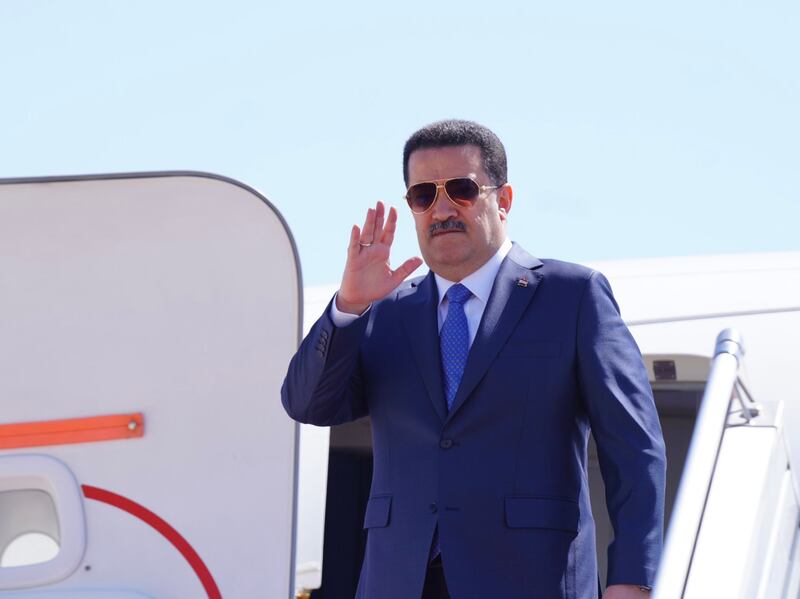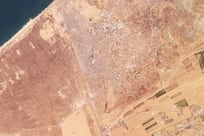Iraq's “heist of the century” investigation could widen following an Interpol red notice request from Baghdad to arrest high-ranking former politicians, sources told The National on Tuesday.
The officials named by the Iraqi government include former finance minister Ali Allawi and aides of former prime minister Mustafa Al Kadhimi, whom Baghdad says now all live outside Iraq.
Although the initial announcement from Baghdad on Sunday was that red notices had been issued, that does not seem to be the case. Interpol told The National that they would not comment on the case, but noted that “a red notice is not an international arrest warrant,” and they would review any request from a member country.
The Interpol website does not list any of the men as being the subject of a red notice.
The theft of $2.5 billion from Iraq’s General Commission for Taxes, a department in the Ministry of Finance, has been nicknamed by Iraqis the “heist of the century.”
The case centres on the discovery of 250 fraudulent cheques that were written from the commission to five shell companies between 2021 and 2022, which were then cashed. The funds are suspected of being flown out of the country from Baghdad International Airport.
It is regarded as one of the worst abuses of public funds in Iraq, which ranks 157 out of 180 countries on the global Corruption Perceptions Index.
This week, Haider Hanoun, the head of the Iraqi Commission for Integrity – Iraq's main counter-corruption agency – called on “competent authorities in the US and the UK to co-operate in executing arrest warrants” issued against four men in March.
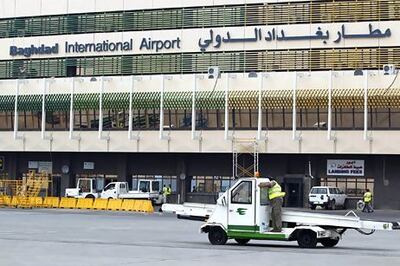
“The investigation has no limits, and if proof arises to the involvement of anyone from any government then they will be investigated,” Farhad Alaadin, foreign affairs adviser to Prime Minister Mohammed Al Sudani, told The National.
An investigation was launched by former prime minister Mustafa Al Kadhimi and followed up by his successor Mr Al Sudani a few days after his government was sworn in last October.
A source close to the matter told The National that finance officials could be next.
“They are planning to target officials in the Rafidain bank and link it to the heist of the century,” said the source.
The battle over corruption
The next step is that the “Iraqi Interpol will be working with their international counterparts for (the red notice) execution and handover of the individuals to Iraq,” Mr Hanoun, who is the head of the integrity commission, told The National.
Asked if the commission has sufficient evidence against the accused, Mr Hanoun said the matter is a legal issue.
“It is related to whether someone is proven to have committed a crime according to the law and the issuance of a judicial decision against him. It is not random,” he said.
However, sources close to the case told The National, claiming that the commission does not have “sufficient evidence” to charge the four men and that evidence points to a “political agenda”.
Mr Hanoun was appointed by Mr Al Sudani, and ran as a candidate in Iraq's 2018 elections with the Iran-backed Fatah list.
“The arrest warrants are currently under Interpol’s investigation, but, there doesn't seem to be enough evidence to hold against them,” said the source.
“Interpol needs to investigate each case independently, so they must be agreed upon internally,” it said.
Interpol's guidelines say it is “strictly forbidden for the organisation to undertake any intervention or activities of a political, military, religious or racial character”.
“Ali Allawi is still under the commission's investigation, there is no sentencing or evidence against him or the other men. This shows that there are some political points behind these moves,” said the source.
One former adviser to Mr Al Kadhimi said it was “clear that they are using these cases and these files to target some people on one hand, and on the other hand to divert public attention from what is going on right now – the failure with electricity and the failure dealing with the Iraqi currency crisis.”
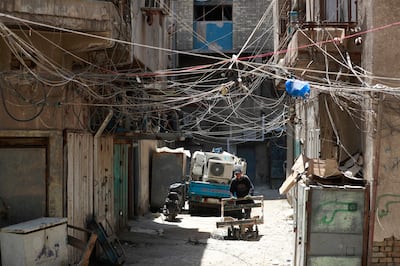
The former adviser said it was surprising that the main suspect in the case, who is accused of organising the signing of fraudulent cheques to two of the five shell companies, was detained at the end of last year but has been allowed to roam for months by the judiciary.
He said he did not rule out guilt among some of those accused, but said that overall, the call for the Interpol red notice was to present the image of fighting corruption.
“There are many failures and they are using this to say that we are working on the most important issue, which is corruption.”
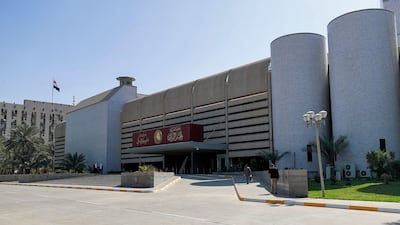
Fanar Haddad, a former adviser to Mr Al Kadhimi who has now returned to his academic work, said that corruption and political vendettas are not mutually exclusive.
“Without presuming the guilt or innocence of any particular individual, I think it would be naive to believe that there was no corruption in the previous government (or any post-2003 government for that matter),” he said.
“However, it would be equally naive to presume that the current government's anti-corruption measures are operating independently of political considerations and the relations of power that govern Iraqi politics,” Mr Haddad said.
Airport intrigue
One of the central features of the heist is how $2.5 billion in cash was smuggled out of Baghdad airport without security forces noticing.
Mushtaq, whose real name is withheld for security reasons, formerly worked with Iraq’s Integrity Commission and says corruption has long been rife at Baghdad airport.
The sprawling site, which has three terminals, one for passengers, one for the military and one for VIPs, is divided among rival Iraqi factions linked to militias and official security forces.
This, he said, blurs accountability for failure to spot smuggled cash leaving Iraq, because no single agency can easily lead investigations.
“There are five security organisations working there, and multiple entities means everyone gets a cut. There is the Iraqi Border Points Commission, chaired by Maj Gen Omar Al Waili which reports to the prime minister.
“There is the customs police, part of the ministry of interior,” he says, referring to a ministry that has long been infiltrated by – and at some points run by – the Iran-backed Badr Organisation.
“There is the Iraqi National Intelligence Service (formerly run by Mr Al Kadhimi) and the Iraqi National Security Service (another branch of internal security). Not to mention the head of the security department in the Iraqi Civil Aviation Authority.”
These rivalries blur lines of accountability and have become increasingly heated in recent years, in particular since the assassination of Iranian general Qassem Soleimani in January 2020 in a US drone strike on Baghdad's airport road, and with him, the de facto head of Iran-backed militias, Abu Mahdi Al Muhandis.
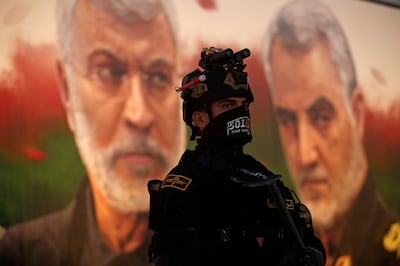
Iran-backed groups would spend the ensuing term of Mr Al Kadhimi, who came to office in May 2020, trying to increase their influence at the airport, rounding on G4S, a British company that ran security there, including baggage checks.
The militias also claimed Mr Al Kadhimi had been complicit in the US drone attack. At the time of the air strike, the Badr Organisation-linked Ali Taqqi was the director of the airport.
A suspected Iran-backed group, Saraya Al Thar Al Shuhada, or the Brigade of the Martyr’s Revenge, fired a rocket at a G4S office near Baghdad in September that year, injuring two civilians nearby.
And in January 2022, the head of security at the airport, Hussein Ali Hussein, was kidnapped and held for several days by unknown assailants.
“I believe it's impossible for a thing at this scale to happen without everyone's knowledge and certain degree of buy-in,” Mushtaq says. “The system is built that way.”
